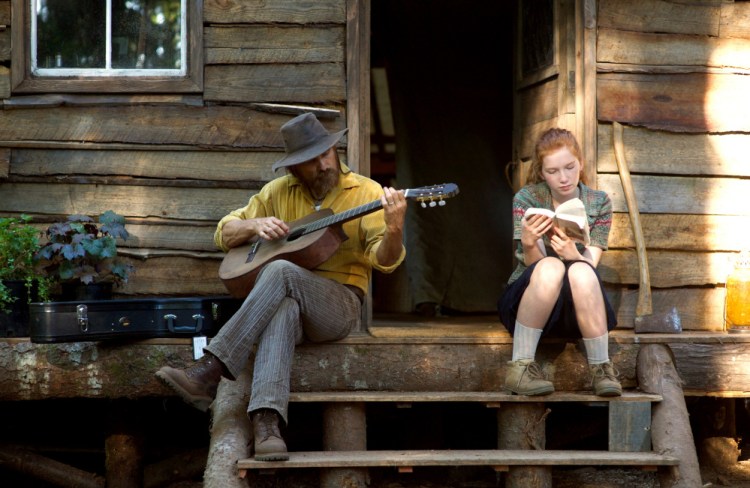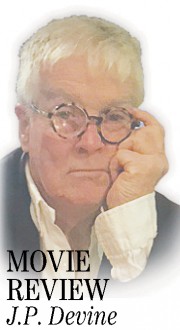In the first moments of writer-director Matt Ross’ new film “Captain Fantastic,” we are treated to a close-up of a beautiful deer foraging in deep woods. We know, because we’ve seen similar scenes in many movies, that this isn’t going to go well for the deer.
Sure enough, within moments, a long-haired teen (George MacKay) covered in mud, leaps from the bushes and slashes the deer’s throat with a serrated hunting knife.
Then, suddenly, a bevy of red-haired girls and boys arise like plants from the bushes, accompanied by our hero, Captain Fantastic (Viggo Mortensen) — Ben, the boy’s father. Ben steps forward and, in true Sioux warrior fashion, cuts out the deer’s heart, wipes the blood on his son’s face, while, in sort of a native American bar mitzvah, intones, “The boy is gone. Now the man emerges.” With his next move, father Ben feeds the heart to his son, who munches it with courageous gusto, while we begin looking at the floor.
So we find ourselves in the wilderness of the Pacific Northwest, with Matt Ross’ Marvel Comics-titled paean to the almost forgotten 1960s back-to-the-earth culture.
We suspect this because the captain’s home-schooled kids are all saddled with Age of Aquarius names: Rellian (Nicholas Hamilton), Bo (George MacKay), Keilyr (Samantha Isler), Vespyr (Annalise Basso), Zaja (Shree Crooks) and Nai (Charlie Shotwell.)
Daddy Mortensen’s Ben is clearly an intellectual outlier with an expensive, multi-layered education, laced with anger issues with the establishment. OK, that’s current and cool, albeit tiresome, but I’m still struggling with the deer heart lunch.
Ben has set his family, like that Swiss family bunch, in some pretty deep woods.
Captain and the home-schooled kids (a more fun title) live a life of books: “Brothers Karamazov,” “Lolita” and Noam Chomsky. They all speak six languages and eschew all organized religions. Instead of Christmas, they celebrate Noam Chomsky Day, in honor of the great libertarian socialist and political activist, by dancing with his posters; but no Christmas tree.
So we have the anti-establishment Tarzan of the Cascades and his flock, but where is Jane?
Here it grows sad and darker. The family mother, Leslie (Trin Miller, seen only in Captain’s dreams), is in the hospital somewhere in New Mexico, where she is undergoing treatment for a progressive mental illness. Any lightness disappears when the news comes that she has committed suicide.
The family boards their Ken Kesey bus and heads across country to their mother’s family home, where wealthy conservative patriarch Jack (Frank Langella), who has been overseeing her treatment, has been planning her conservative funeral.
But Ben has her last will and testament, ignoring it seems, that it was scrawled on wrapping paper when she was suffering from depression. In a few lines, she insists that she be cremated, and her ashes flushed down the nearest toilet.
Ben and the kids are determined to fulfill her tortured last wishes, including the toilet. But once they are all exposed to the “real” world, conflicts arise.
Ben’s strict father-in-law, who threatened to have Ben arrested and deprived of his kids, turns out not to be a cardboard cutout character, but a normal loving and reasonable grandfather who only wants the best for his grandchildren. Actor Langella walks a thin line and wins us over, but not before the expected clashes.
Mortensen, who is a past master of the strong, silent stoic, embraces his role with relish. The children love him, mainly because they get to have so much fun. They are brilliant and adaptable, and that always helps where there is no electricity.
But reality begins to bubble up when son Bo meets a girl at a trailer park and realizes that he’s a bigger fish out of deeper water than he thought.
All the kids are wonderful. Mortensen, always better in action roles, nonetheless gives his role the proper ingredients, a lightness and a darkness.
Matt Ross, a television actor-writer, uses his cast well.
Stephane Fontaine’s camera gives us a gorgeous look, and perhaps a writer’s commentary about two distinctly different worlds, as the family travels out of the verdant silence into the commercial chaos of McDonald’s America. But both, in the end, come together like cream in coffee, and a touch of sugar.
J.P. Devine is a former stage and screen actor and the author of “Will Write For Food.”
Send questions/comments to the editors.



